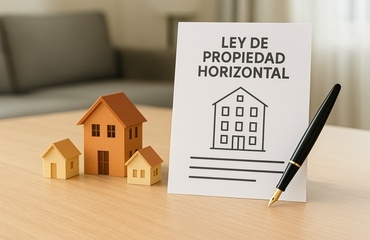
How Homeowners Associations Work: Rights, Duties, and Agreements
If you're thinking about buying a home and wondering how homeowners’ associations work, you should know they are the core of any community of owners. Important decisions that affect both coexistence and the property rights of each owner are made in these neighborhood meetings. But what happens when an unfair or illegal decision is approved? What options does a neighbor have if they feel harmed?
In this article, we explain what homeowners’ associations are and the legal grounds for challenging a neighborhood meeting, the steps to take, legal deadlines, and how to defend your rights in case of conflict.
What is Decided in a Neighborhood Meeting?
The homeowners’ association is the sovereign body of a community of owners. It approves key decisions such as electing the president, hiring the property manager, approving budgets, maintenance work, renovations, or even modifying the community statutes.
All decisions must comply with the Horizontal Property Law (HPL) and the community’s own bylaws. Each vote must meet the required quorums, and all decisions must be accurately recorded in the minutes. However, these principles are not always respected. Sometimes, decisions made in the neighborhood meeting may violate the law or the rights of one or several owners. In those cases, the door opens to legally challenge the homeowners’ association meeting.
What are the Legal Grounds to Challenge a Homeowners' Association Meeting?
Challenging a neighborhood meeting is not a matter of simple disagreement. For the legal challenge to have merit, there must be valid reasons justifying the nullity or voidability of the agreement. The most common grounds include:
Violation of the Horizontal Property Law or the Community Bylaws
Any decision passed in the homeowners’ association that contradicts the Horizontal Property Law or the community’s bylaws can be challenged. This includes, for example, decisions that limit the use of common areas without the required unanimous vote or that approve works without the legally required votes.
Abuse of Rights or Arbitrary Decisions
When a decision clearly benefits a minority while harming the majority, or is made against the general interest of the community, it may constitute an abuse of rights. This principle protects owners from arbitrary or disproportionate decisions.
Serious Harm to One or Several Owners
Any decision that causes proven, serious individual harm can be legally challenged. For example, if a neighborhood meeting approves construction that restricts access to a home without compensatory measures, or imposes unjustified expenses on certain owners.
Invalid Call to Meeting
The neighborhood meeting must be called with the legally required minimum notice (typically 6 days) and must include the agenda. If this is not fulfilled, the decisions may be void due to a breach of the right to information.
Lack of Legal Quorum or Majority
Decisions at the homeowners’ association must be adopted with the required majority under the HPL. Depending on the matter, a simple majority, qualified majority, or unanimity may be needed. If the required votes are not met, the agreement may be invalid.
Lack of Competence of the Association
The homeowners’ association cannot decide on matters outside its authority. For instance, it cannot impose sanctions on an owner or make decisions that fall under other legal entities.
Who can challenge a Homeowners' Association Meeting?
Any property owner who voted against the decision, abstained, or did not attend the homeowners’ meeting can file a legal challenge. This also applies to someone who delegated their vote, as long as the proxy did not vote in favor of the agreement. Those with unpaid community fees cannot challenge unless they have deposited the claimed amounts with the court.
Additionally, if you're thinking of buying or selling your home, it’s important to check if there are any ongoing legal challenges, as they can directly affect the property’s value or create future liabilities for new owners.
Deadlines to Challenge a Community Agreement
Deadlines for challenging a homeowners’ association meeting are set by the Horizontal Property Law:
• Three months from notification to challenge based on abuse of rights or individual harm.
• One year if the decision is contrary to the law or the community bylaws.
Once these deadlines have passed, the right to challenge is lost, so it’s essential to act quickly.
How to Challenge a Homeowners' Association Meeting: Step-by-Step Guide
When a decision made at a neighborhood meeting seems unfair to you, you have the right to challenge it. Here’s a clear, step-by-step guide on how to do it.
Step 1: Review the Minutes and the Bylaws
Before initiating any legal action, review the meeting minutes, which contain the adopted decision, the votes cast, and the quorum reached. Also, analyze the bylaws and the Horizontal Property Law to confirm whether any irregularity occurred.
Step 2: Extrajudicial Claim
In many cases, to challenge a homeowners’ association meeting, it’s advisable to start with a written claim to the president or the property manager. This communication should clearly state the reasons for disagreement and request a new meeting or the annulment of the agreement.
Step 3: Filing a Legal Claim
If there’s no response or the community rejects the claim, the next step is to go to court. The lawsuit must be filed with the Court of First Instance in the location of the property. You’ll need a lawyer and a court representative.
During the legal process, the judge will assess whether the challenged agreement violates legal or statutory rights. The court may annul, modify, or reject the lawsuit.
Required Documentation to Challenge a homeowners' Meeting
To file a legal challenge with proper guarantees, it's recommended to have the following documentation:
• Copy of the minutes from the challenged meeting.
• Copy of the community bylaws.
• Communications with the president or property manager.
• Evidence of the harm suffered, if any (photos, technical reports, witnesses).
• Documents proving lack of quorum, invalid notice, or illegalities.
The more complete and well-supported the documentation is, the higher the chances of success in your legal challenge.
What Are the Consequences of a Legal Challenge?
If the judge upholds the lawsuit, the decision will be partially or entirely annulled, and its effects will be invalid from the moment the ruling is issued. This may lead to reimbursement of fees, halting of works, or even the need to reconvene a new homeowners’ association meeting to vote again in compliance with the law. If the legal challenge is not successful, the owner may be required to pay legal costs if the judge so orders.
Tips to Avoid Conflicts in a Community of Owners
The best challenge is the one you never need to make. That’s why, whether you’re the community president or an owner, it’s wise to promote transparent, participative management in each homeowners’ association meeting:
• Call meetings clearly and in advance, including all relevant information.
• Allow all owners to participate and consider their proposals.
• Act in accordance with the law and the community bylaws.
• Avoid unilateral or rushed decisions that may lead to conflict.
• Document everything in writing to prevent misunderstandings or false interpretations.
A climate of mutual trust is key to peaceful coexistence and a well-managed community.
Now that you know How to Challenge a Homeowners' Association Meeting, Decide Wisely
Challenging a homeowners’ association meeting is a legitimate right that protects the interests of all neighbors and ensures the legality of community decisions. If you face a decision that you consider unfair, arbitrary, or unlawful, don’t hesitate to act within the legal framework and seek professional advice.
Knowing your rights, acting with a solid foundation, and gathering proper documentation are the keys to a successful legal challenge and a fair, well-functioning community.
Frequently Asked Questions (FAQs)
Can I challenge a decision if I didn't attend the meeting?
Yes, as long as you did not vote in favor or delegate your vote to someone who did.
What happens if the decision was made without the required quorum?
In that case, the decision can be declared null and void if it didn’t meet the legally required quorum.
Can I challenge a decision even if I wasn't directly affected?
It depends on the reason. If the law or the bylaws were violated, then yes.
Is it mandatory to hire a lawyer?
Yes, if you go to court, you must have a lawyer and a court representative to file the lawsuit.
Can I recover legal costs if I win?
Yes, if the judge upholds your claim and orders the community to pay the costs.











